This post will set the tone for the next two years of my life.
But first, I have to say how much I appreciate the team over at threadsmedia.com. They are doing a great ministry over there, trying to be honest about faith and life and trying to sort out what it means to be a Christian in today’s world. They’ve let me play in their sandbox as an almost “adjunct” team member going to (some) team meeting and posting my thoughts on the blog. I always want to add to the conversation and add to their ministry, never detract from it. And that’s why I’m OK with this:
A blog post of mine was recently taken down.
The official reason is that it was off-topic from the direction the blog has been heading. I’m ok with that. The post (which we’ll get to in a few lines) was definitely an experiment and, honestly, not my best work. It is more the kernel of an idea… the thoughts that I’m struggling with right now.
The intent of the blog at threadsmedia is to talk about our reactions to things that happen in life. My post was my reaction to something I read that really hit home with me and I thought would be a great way to open up a new conversation for the readership of threadsmedia to discuss.
Ironically, I did not put the post on this blog for two reasons:
1) I wanted to start diversifying my writing between what goes on here, threads, and my readingthebible blog.
2) The post was written with the threads audience in mind, introducing them to my struggles in life with a topic that most people who know me personally (i.e. the readership of this blog) probably already know.
Without further ado, the lost post of Aaron on threadsmedia.com:
*** May I talk about Robots? It was recently announced by Tennessee Congressman Zach Wamp and Pennsylvania Congressman Mike Doyle that, starting in September, there will be a congressional caucus to learn about robots. This… could be big. As robots get more and more pervasive in society, it’s important that we begin to try and figure out what the ethics and morals are for them. Eventually, their artificial intelligence will match/exceed our own. As robots move past being our vacuum cleaners or pets and become integrated into society, life as we know it will quickly change.So, now that the American government is waking up to the realization that there is something to discuss here, shouldn’t we as the church begin to sort out our thoughts? What happens to us, morally, if someone write some bit of code that gives robots true feelings? Are we morally obligated to them? What happens when some software is finally written that doesn’t need to be rebooted and can stay on forever, learning and thinking… do we have a right to take out its batteries? Are we to hold true to Asimov’s three laws… or does that essentially make these robots little more than slaves? I don’t have any kind of answer for any of this yet. But I want to explore it. Shouldn’t the church and all our visionaries begin to enter this conversation? Is this something that we need to be involved in, or do we trust that this is some subject the government can handle on it’s own? How do we as Christians begin to work through our morals and spirits to something so absent of life yet so full of potential? ***So… it’s not my best work nor is it a fully-realized document at all. To me, the ideas presented there are more like saying “hey, there’s a thing called an iceberg” moreso than studying what’s a mile or two deep into the iceberg… let alone 100 miles deep.
This conversation, however, is so far off the norm for typical spiritual conversation that it looks odd and out of place on the threadsmedia blog. Like I said – I’m not at all upset, wounded, or disappointed with the choice to take it down. I get it. I understand the reasons and fully support it. I’ll keep on writing for the blog and be honored and amazed that they even let me have a login.
My struggle is coming down the line, though. I’ll be seeking people to have these kinds of conversations with and I’m not sure where to have them. I’m genuinely concerned for the Church of America that is blind to what’s happening around us in regards to science, biology, culture and, well, the future.
And so, this August, I will begin working through the University of Houston’s Studies of the Future Master’s Program under the tutelage of Dr. Peter Bishop. I hope to join the conversation of contemporary futurists and help shape culture there. I hope there’s a place for me in the conversation of the Church to figure out how we are to react to changes in culture that are coming. I pray that I’ll still be loved an accepted by my Southern Baptist brethren as my words and ideas might be new.
I know that there are struggles coming for me. It’s going to be hard to walk the line between being informative and helping change lives with my studies and not sounding like an eccentric sci-fi author. Taking this new knowledge and translating it into some kind of text or study will have to be prompted by the Holy Spirit because I don’t know how to approach it.
I want to talk about synthetic life and what it means for Creation. I want to talk about gay bomb warfare and what it means for sexuality. I want to talk turning off DNA, installing auditory nerve implants and I want to talk about whether or not turning off robots is morally ok for a Christ-follower.
I’m excited to start the futurist program at UH as it will give me an opportunity to have these conversations and, just maybe, gleam some insight as to what it means for us spiritually. Maybe one day God will grant me some nugget of wisdom worth imparting so some listening audience, somewhere. And perhaps, just by chance, I might get to talk about robots.









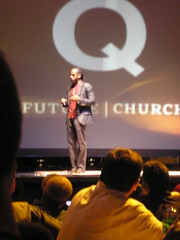 Jeff Johnson educated me.
Jeff Johnson educated me.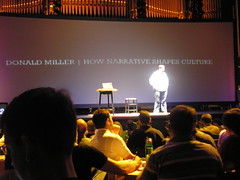
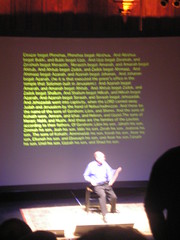
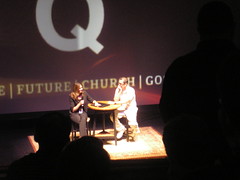
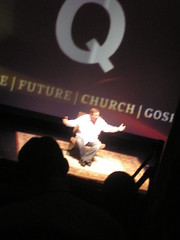
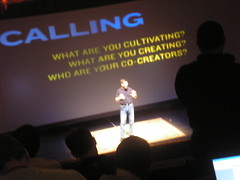 Our second speaker was Andy Crouch, editorial director of ChristianVisionProject.com for Christianity Today and author of the upcoming book, Culture Makers.
Our second speaker was Andy Crouch, editorial director of ChristianVisionProject.com for Christianity Today and author of the upcoming book, Culture Makers. 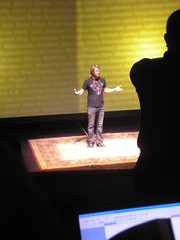 We arrived right before 10, got registered and found a seat in the balcony, and then the event began.
We arrived right before 10, got registered and found a seat in the balcony, and then the event began.